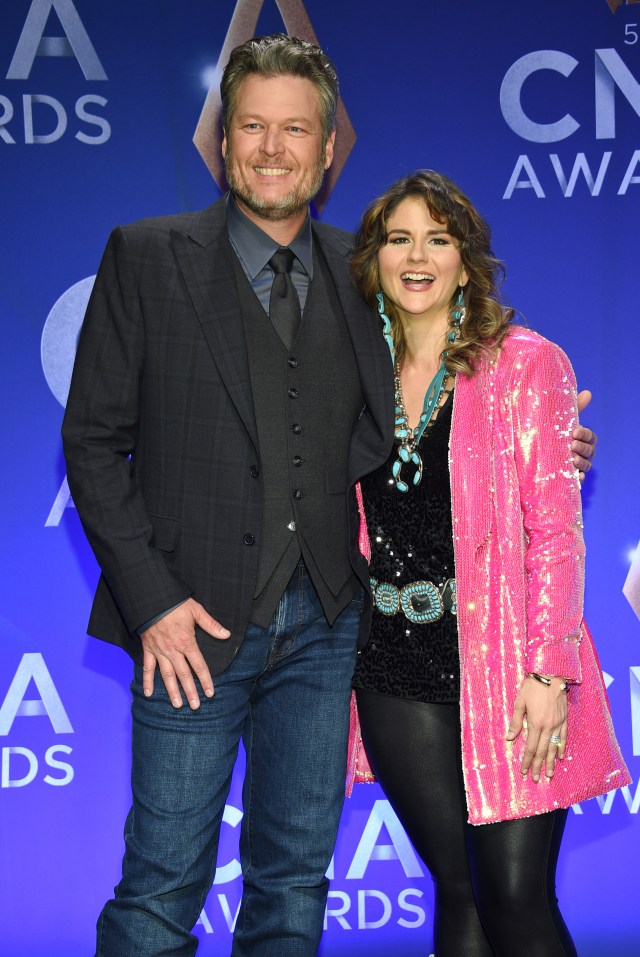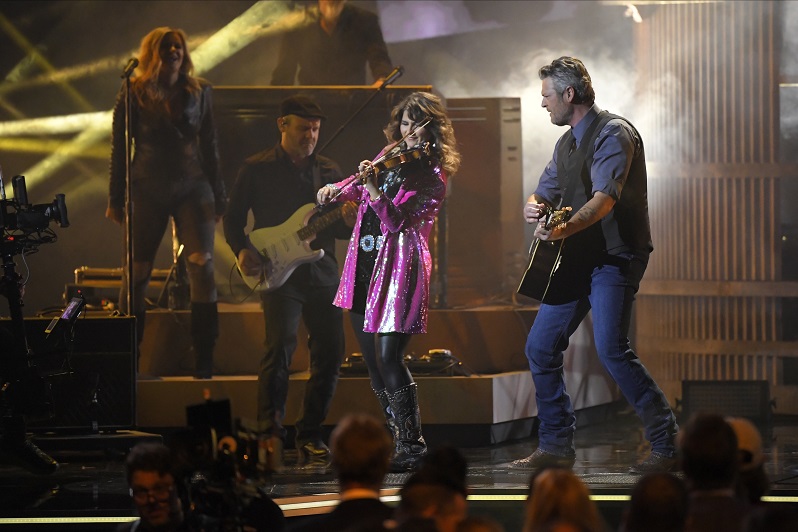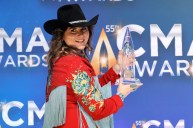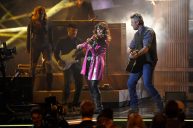[dropcap]A[/dropcap] lifetime of experience and an undying love for country music's great lineage of session musicians prepared 36-year-old fiddle player Jenee Fleenor to make history on Nov. 13 as the first woman to win the CMA Musician of the Year award.
Videos by Wide Open Country
Fleenor began classical violin lessons at age three, but the Arkansas native's path to Nashville began two years later when she first heard Bob Wills' nearly 40-year-old western swing standard "Faded Love."
"I heard it, and I started playing it one day," Fleenor said. "I remember standing up on like an old wooden chest and I played it for my dad when I was five years old. I played it by ear. That was the first moment when country music hit a chord in my heart somewhere, so that definitely was a pivotal moment when my parents said, 'Maybe we should get her some fiddle lessons along with her classical lessons.'"
As if Wills' exemplar fiddling on "Faded Love" wasn't enough to seal the deal, Fleenor soon fell for a more contemporary standard.
"Another song that was pretty pivotal was hearing Willie Nelson's 'Whiskey River' for the first time," she said. "I remember jumping up and down on my parent's bed, going wild. My mom always loved Willie Nelson, but something about that song got me started up. I didn't know what whiskey was!"
Fleenor went on to become a fervent radio listener during the heyday of '90s country, introducing her to such fiddling giants as Mark O' Connor, Larry Franklin and Glen Duncan.
"I just knew when I heard the radio that I wanted to do that," she added. "Wherever you go to play on those amazing country songs, I'm going to do that someday."
Bigger strides toward Fleenor's career came at age 14, when she was first hired to play in house bands at steel guitar conventions attended by the likes of John Hughey, Hal Rugg, Speedy West, Buddy Emmons, Jimmy Day and other names recognizable by those who, like Fleenor, study classic albums' liner notes.
"A lot of these players would request that I play with them on these shows," she said. "It wasn't that I was in the house band. They'd make a request that they wanted a 16-year-old me playing with them. I was so honored."
In this setting, Fleenor found a mentor less famous than someone like Emmons, yet deeply passionate about country music musicianship.
"When I started playing these conventions, there was a drummer named Dwain Carger," Fleenor said. "He loved these steel guitar conventions, and I remember sitting with him and he showed me the importance of when you take a solo, you come in strong. We'd sit and listen to records, and he'd show me where the steel guitar player came in or the fiddle player and say, 'See where they came in? Right at the end of the vocal. You need to come in really strong right there. You can't be timid.'"
Fleenor moved to Nashville straight out of high school in 2001 to attend Belmont University. Prior contacts and undeniable talent quickly positioned her for the type of enviable gig some wait years to land.
"Two weeks after I moved to town, I stepped into the Station Inn," she said. "My friend Brandon Rickman, who's the lead singer of Lonesome River Band now, was playing with Larry Cordle and Lonesome Standard Time. Brandon said, 'Get your fiddle,' and he had me play backstage for Larry and the band. I didn't know that Larry was looking for a fiddle player at the time. I'm green, and I literally just moved to town. He's going, 'That's the shit. That's the shit!' I didn't know what 'that's the shit' meant. Maybe I was playing bad or something. It actually meant that I was playing really good, and Larry hired me to go on the road with him. Within a month of moving to Nashville, I was playing on the Grand Ole Opry with Larry, and I was on the road with his bluegrass band."
Cordle knew Fleenor would eventually outgrow his bluegrass band, although they were successful and originated the song "Murder on Music Row."
"Larry kept telling me, 'You're going to get a call from a big country star. I know it,'" Fleenor said. "Sure enough by that next summer, I got the call to play for Terri Clark. Things moved very quickly, and I was thankful. I was prepared if they didn't, because I know this town can be hard."
As Clark aided another talented woman's career, Fleenor learned the final necessary skill for her current role as a sought-after session player.
"I was with Terri for six, seven years maybe, and during that time my husband bought me a Pro Tools rig for my birthday," Fleenor said. "I remember sitting and crying because I didn't know how to record stuff on it. I read the book and worked with a few engineers, but I was so frustrated. Finally, there were a few engineers I worked with, and after sessions I was doing they showed me how to work Pro Tools easy enough to where I could get my own tracks done. That was pivotal in what I do today because a lot of sessions people send to me and I do [them] from home."
In late August, after years of playing on records by Martina McBride, Reba McEntire, Blake Shelton, Jon Pardi and others, Fleenor received two shocking pieces of news. She was nominated for the CMA's Musician of the Year, and she was the first woman nominee for an award that debuted in 1967 as Instrumentalist of the Year.
"There's never been a lot of females that I worked with," Fleenor addeds. "I get asked why, and I don't know. I didn't know any girls growing up that said, 'I want to grow up, go to Nashville and play on records.' There's not a lot of women as engineers, too. But maybe this is changing the game some. Maybe they'll realize it can be done. I always say the proof is in the picking."
Fleenor's win placed her in the same lineage as Chet Atkins, Roy Clark, Jerry Reed, Don Rich, Johnny Gimble and Mac McAnally. Despite joining a field as impressive as most CMA categories' list of past winners, Fleenor's big moment came before the ABC broadcast.
Fortunately, someone allotted two separate performances that night saw to it that Fleenor got a piece of the prime-time television spotlight.
"Maybe a week beforehand, I got a message that said Blake wants this to be a fiddle solo (in 'God's Country') because he's so proud of my nomination," Fleenor says. "He didn't have to do that. I love Blake so much. He's always helping other people. I sent him a message saying, 'Blake, thank you so much.' I get emotional thinking about it.
"The fact that I won it, we had a moment backstage," Fleenor adds. "He and Gwen walked up, and they were just so excited. It's everything I ever dreamed of, and the fact that I got to step out and take a solo that wasn't on that record was a huge moment for me."

Singer Blake Shelton, left, poses with musician of the year award winner Jenee Fleenor in the press room at the 53rd annual CMA Awards at Bridgestone Arena on Wednesday, Nov. 13, 2019, in Nashville, Tenn. (Photo by Evan Agostini/Invision/AP)
Gwen Stefani wasn't the only rock 'n' roll celebrity over the moon about a throwback country fiddler's big night.
"I play with Steven Tyler in the band he tours with outside of Aerosmith called Loving Mary," Fleenor said. "I guess I played with him a couple of weeks ago, and he told me, 'If I was in the audience, I'd be yelling your name so loud!' He sent me flowers with a card that said, 'I knew it, I knew it, I knew it!' I looked at my husband when I got them and said, 'Is this even real life? Steven Tyler sending a fiddle player flowers.'"
Fleenor isn't slowing down to enjoy the moment. She just released an example of her work as a singer-songwriter, "Fiddle and Steel," and there's another song on the way titled "Good Ole Girls." However, she has caught herself connecting with old songs in a new way during her journey from historic nominee to groundbreaking award winner.
"The last time I played 'Dream On' with Steven, I giggled to myself because I knew about the nomination," she said. "That song means so much more to me now. It's like God had these grandiose plans you can't even think up yourself."
Now Watch: 10 Legendary Instruments of Country Music
https://rumble.com/embed/u7gve.v43t3h/




